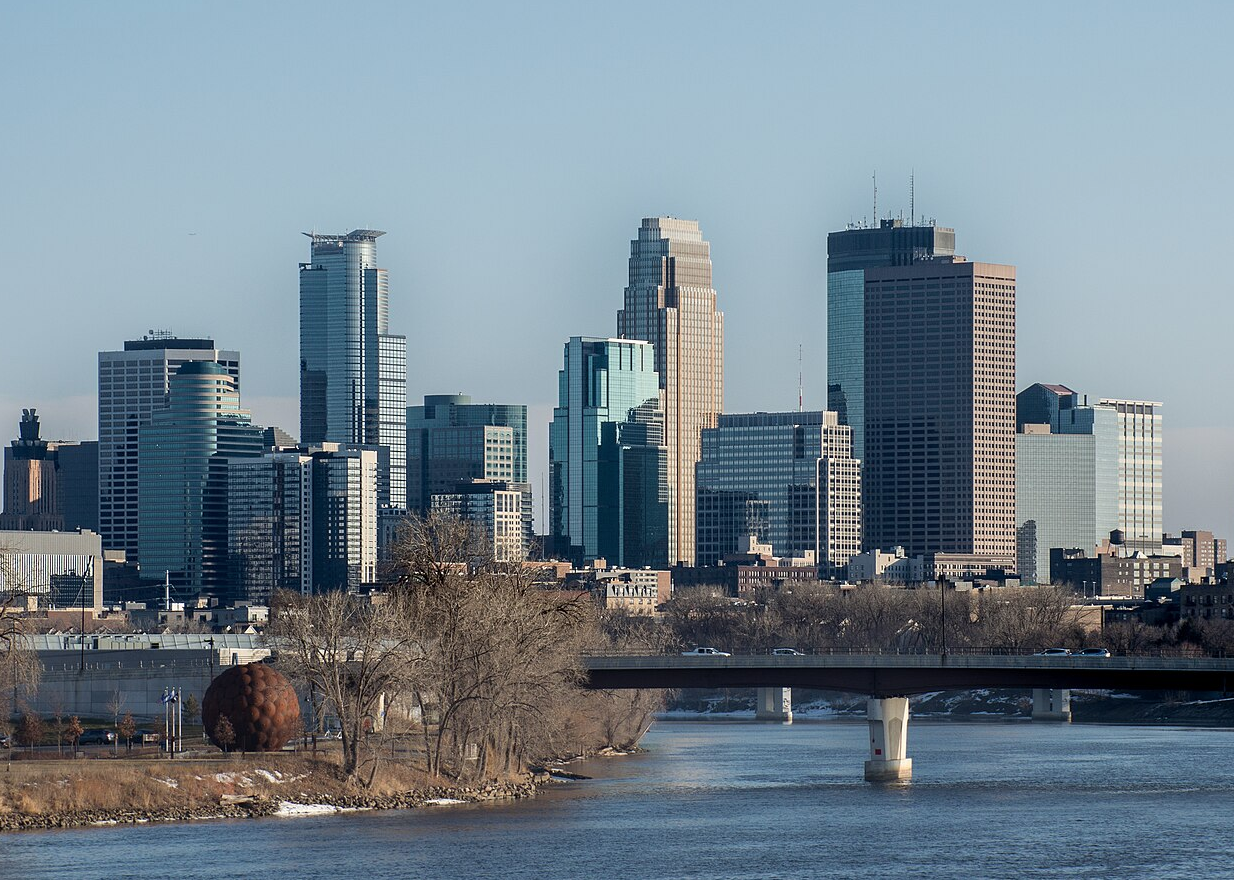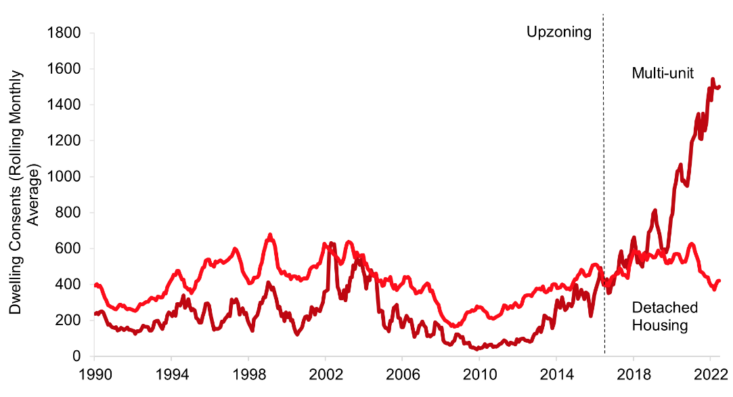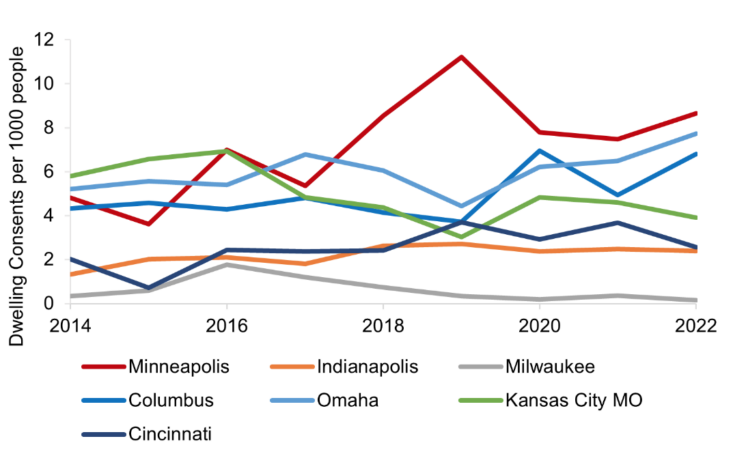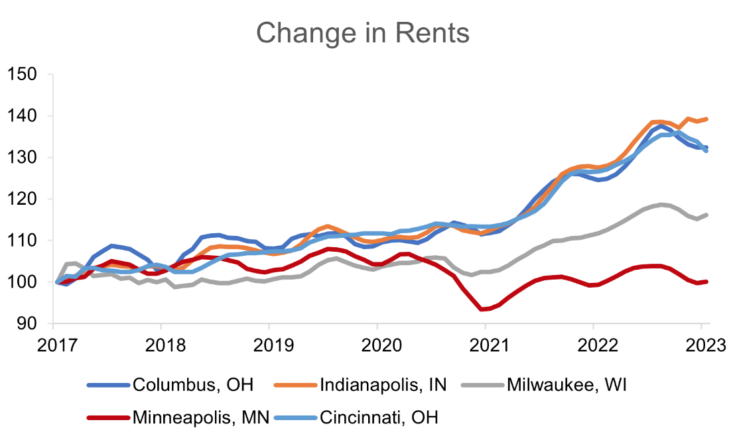
In recent years, Minneapolis enacted a set of reforms making it easier to build multifamily housing. Tim Peach directed me to a blog post written by Matthew Maltman, which suggests the effects have been fairly dramatic:

Update: The above graph was posted by mistake, it shows Auckland, NZ. The relevant graph is as follows:

Scott Alexander recently suggested that building more housing might actually boost housing prices, by making cities more dense. In a previous post, I used cross sectional evidence to cast doubt on that claim. Maltman’s post provides time series evidence that rents in Minneapolis have risen by substantially less than in other midwestern cities:

Another graph shows declining homelessness in Minneapolis, at a time homelessness was rising in comparable cities.
In contrast, housing construction plunged soon after St. Paul voters enacted rent control in 2021:
When it comes to construction of duplexes, triplexes and other forms of multi-family housing, St. Paul’s building permits plummeted by 48% last year [2022] compared with the year before, according to HUD, the federal department of Housing and Urban Development.
Scott Alexander is correct that bigger cities are often more expensive. (Not always; compare Houston and Austin.) When a city grows rapidly because of a rapid increase in the number of people who wish to live there, housing costs often rise. Austin is a good example. But when the housing stock rises due to regulatory changes making it easier to build, housing prices tend to fall.
Never reason from a quantity change.
PS. After writing this post I noticed a Bloomberg piece that makes some similar points.
PPS. Matt Yglesias has an excellent post on the politics of YIMBYism.

READER COMMENTS
Brett
Aug 9 2023 at 12:50pm
St. Paul finally walked back some of that terrible rent control law**, but the damage was done. Hopefully they can pass some YIMBY reforms too and catch up with their sister city.
** The value of the St. Paul rent control experiment is that it was basically a grab bag of everything rent control proponents want. And sure enough, it cratered new housing supply. Now that they’ve exempted construction from within the past 20 years, it will be interesting to see how it recovers – developers of rental housing usually have a 20-25 year time frame for pay-off from what I’ve read.
Bobster
Aug 11 2023 at 11:56am
It won’t recover.
California has that ridiculous rent control after 20 years law and it sucks.
Peter Tulip
Aug 9 2023 at 6:02pm
The top chart shows data for Auckland but the text misleadingly implies it is for Minneapolis
Scott Sumner
Aug 10 2023 at 2:04pm
Yikes, that was very sloppy of me. I’ve added the correct graph.
David S
Aug 9 2023 at 6:14pm
Good post. I had been meaning to catch up on reading about the Twin Cities zoning reform effects, but got sidetracked by the pandemic.
Kevin Erdmann might be taking a deep dive on the impact of zoning changes and housing costs in city to city comparisons. He’s gated on his Substack, but worth the price of admission. One point he makes so far (if I read correctly) is that selective upzoning regulations can result in positive price pressure in certain neighborhoods–but eventually, upzoning will start to normalize prices across the board. Popular cities with many amenities will have demand pressures that keep prices high relative to certain baselines. Also, certain high density construction types are inherently more expensive than sprawl. Ultimately, volume of housing choices makes for the best, and most sustainable, urban experience.
Boston, incidentally, is heading in the wrong direction.
Kevin Erdmann
Aug 9 2023 at 8:03pm
Thanks for the shoutout David.
I don’t think my posts on this topic have generally been gated.
Heres one I just posted today. There is no plausible way, quantitatively, to ascribe high housing costs to agglomeration economies rather than housing constraints.
https://kevinerdmann.substack.com/p/housing-supply-costs-and-urban-value-d28
Scott Sumner
Aug 9 2023 at 8:46pm
Excellent post!
MarkW
Aug 10 2023 at 9:49am
Yes! And it supports what I’ve been arguing for a while — that high prices in some allegedly ‘superstar’ cities are NOT because they’re particularly productive or attractive to new residents. The high prices derive almost entirely from development restrictions. So high salaries in those cities don’t reflect great productivity/growth potential. Those high salaries represent bribes for agreeing to live where housing is so artificially scarce and expensive. Development restrictions create the illusion of great productivity.
Note that Phoenix does rate much higher in desirability than LA, SF or San Diego, but it’s prices are lower because it (like Austin) is actually building housing at a rate that meets (high) demand.
Dylan
Aug 10 2023 at 10:58am
Where are you getting those desirability numbers from? They seem pretty off on their face. When was the last time you heard a fresh college graduate say, I’m moving to Phoenix?
This also doesn’t seem to fully add up. If firms could have their workers be just as productive somewhere else, why don’t they move there? I’m not seeing a great exodus of Wall St. banks moving to Texas. Or big Madison Ave advertising agencies. I do know an investment firm in Tulsa that offers to pay people the same wage in Tulsa, plus rent for a year to move from New York to Tulsa. So far, no one has taken them up on it.
MarkW
Aug 10 2023 at 12:09pm
Figure 2. That’s the point — to measure desirability (‘superstar’ status) by in-migration plus excessive out-migration of people forced out by house prices. That said, those CA cities would have grown much more if their policies were not so restrictive — but even so they still wouldn’t have grown as much as true superstars like Austin, Orlando, Las Vegas, and Phoenix.
robc
Aug 10 2023 at 12:39pm
When is the last time you heard a fresh retiree say, I’m moving to Seattle?
Dylan
Aug 10 2023 at 1:52pm
Well, years ago I heard that all the time. The small town just north of Seattle that I lived in was consistently listed as the best town in America to retire to (which made it kind of suck for a college student). But, all of that is beside the point, as I understood that Mark was connecting that point to the productivity growth in the previous paragraph? A bunch of retirees moving to your town doesn’t do much for overall productivity.
I admit, that I didn’t really follow Kevin’s post well, although I did try to read it. Defining superstar cities in this way is new to me, and perhaps I need to go back and read some of his earlier posts when I have more time. I’ve understood superstar cities to not be the most desirable overall, but more where the high status people and jobs are. You can be a relatively small city like Paris, but still be a superstar because that’s where the fashion people are. No matter how fast Phoenix grows, it isn’t going to be a destination for the jet set any time soon.
MarkW
Aug 10 2023 at 12:50pm
When is the last time you heard a fresh retiree say, I’m moving to Seattle?
It’s actually on our list. But we’d probably get out for some of the dreariest winter months. And you can escape the rain by driving a couple of hours over to the eastern slope of the Cascades. There are cities just over 2 hours from Seattle that enjoy 200 days of sunshine a year.
Dylan
Aug 10 2023 at 2:00pm
Having lived on both sides of the Cascades, I wouldn’t recommend retiring to the east side for very many people. Maybe a town like Wenatchee or around Lake Chelan, but you’d have to be OK dealing with a lot of snow and access to medical facilities is of course difficult the further you get from a major city.
robc
Aug 10 2023 at 3:52pm
How are the tri-cities? I would have moved there 30 years ago if the job I had interviewed for had come thru.
Dylan
Aug 10 2023 at 5:10pm
I haven’t spent much time there and my info mostly comes from people who moved away or seeing stories on the Spokane news, but I wouldn’t have wanted to live there. Felt like meth hit the area kind of hard, but I don’t know how biased that opinion is.
I’ve got a much better impression of Walla Walla then the Tri-Cities for a town in the same area, nice downtown core. Has a good university, kept the small town feel. All in all though, I’m partial to the northern half of the state over the southern just in terms of scenery.
Kevin Erdmann
Aug 12 2023 at 4:50pm
When is the last time you heard a fresh retiree say, I’m moving to Seattle?
The surprising thing about NY, LA, SF, Boston, and San Diego, which are generally the worst in terms of homebuilding and housing costs, is how unremarkable their inmigration stats are.
They are outliers in terms of having a lot of outmigration of poor residents. That’s it.
It seems qualitatively obvious that they are places that attract people who can earn high incomes, but as Mark W. noted above, this may be mostly a false signal.
They aren’t expensive because of a lot of high income earners are moving there. It would be very unlikely for that to be the case, because, according to Census data, that just isn’t happening. They are expensive because supply of housing comes almost entirely from displacement of previous residents. That supply is highly inelastic. In other words, as you work your way through the existing population as more and more of them move away, the remaining families are families that personally choose to pay exorbitant amounts for housing in order not to be displaced.
The demand expressed by the not-yet-displaced drives the cost of housing in those cities more than the demand expressed by newcomers.
Here’s a very old blog post from when I was first looking into these things.
https://www.idiosyncraticwhisk.com/2018/01/housing-part-279-building-homes-helps.html
steve
Aug 10 2023 at 3:26pm
Yet another illustration of why rent control is a bad idea. (Note to self to rewatch Joe’s Apartment.)
Steve
Jim Glass
Aug 13 2023 at 6:47pm
Interesting, entertaining, and semi-relevant:
Home prices / disposable income in the US and around the world, and by other measures. — Patrick Boyle. Lots of interesting data and factoids…
California really is more expensive than the rest of the USA.
The average adult American lives 18 miles from his/her mother.
“Home affordability is much worse in Europe”, and for smaller homes.
“Subtract London and Britain becomes Mississippi.”
Comments are closed.